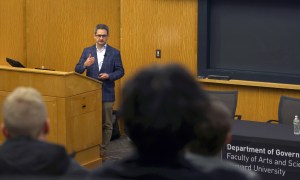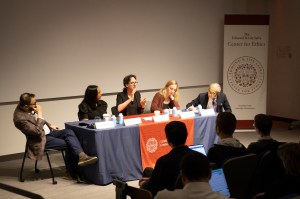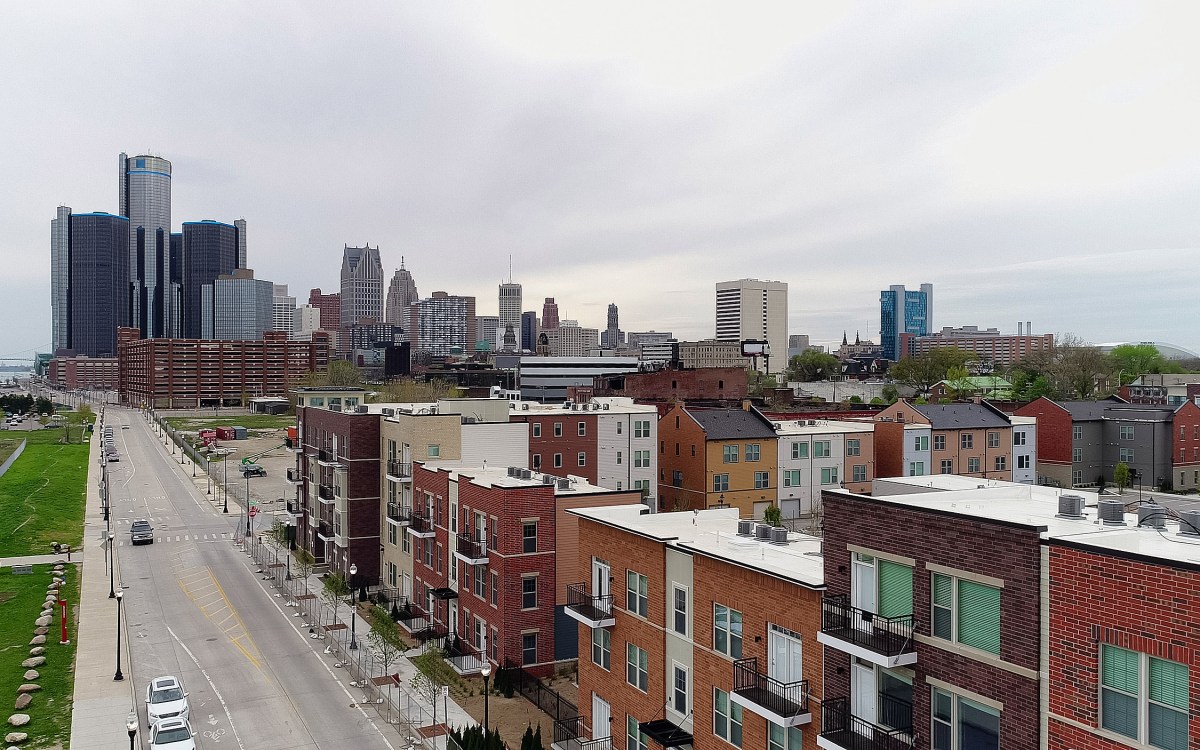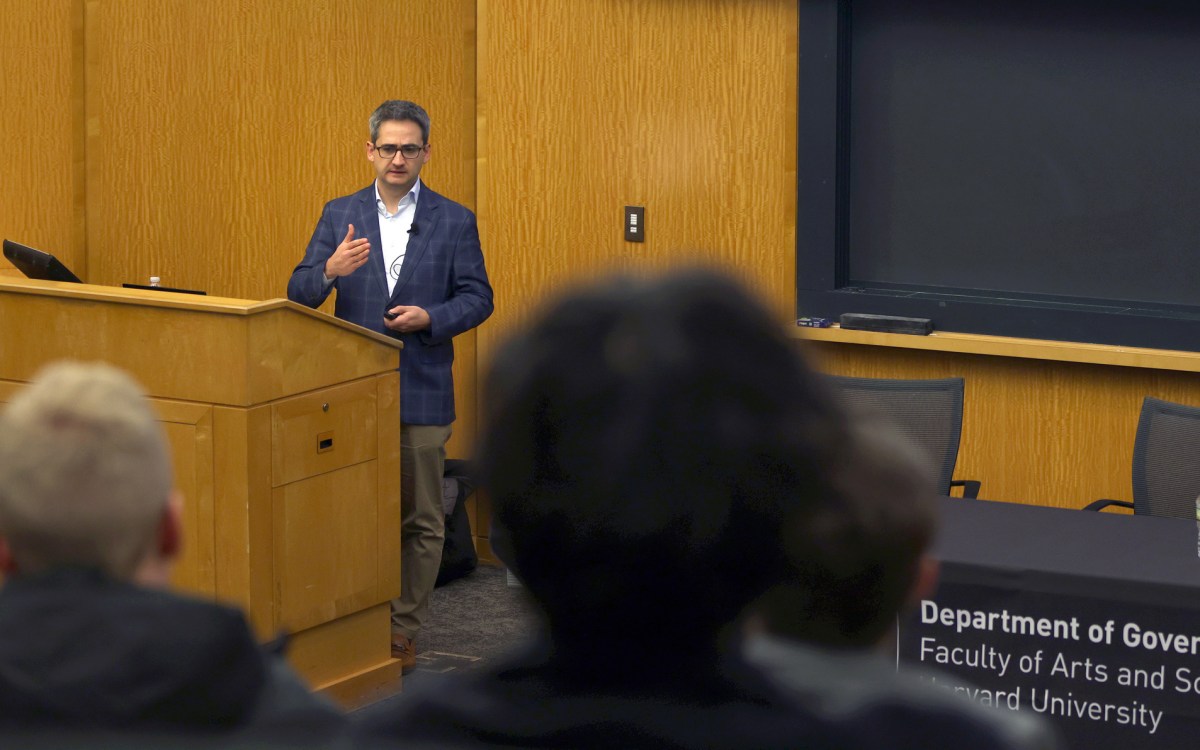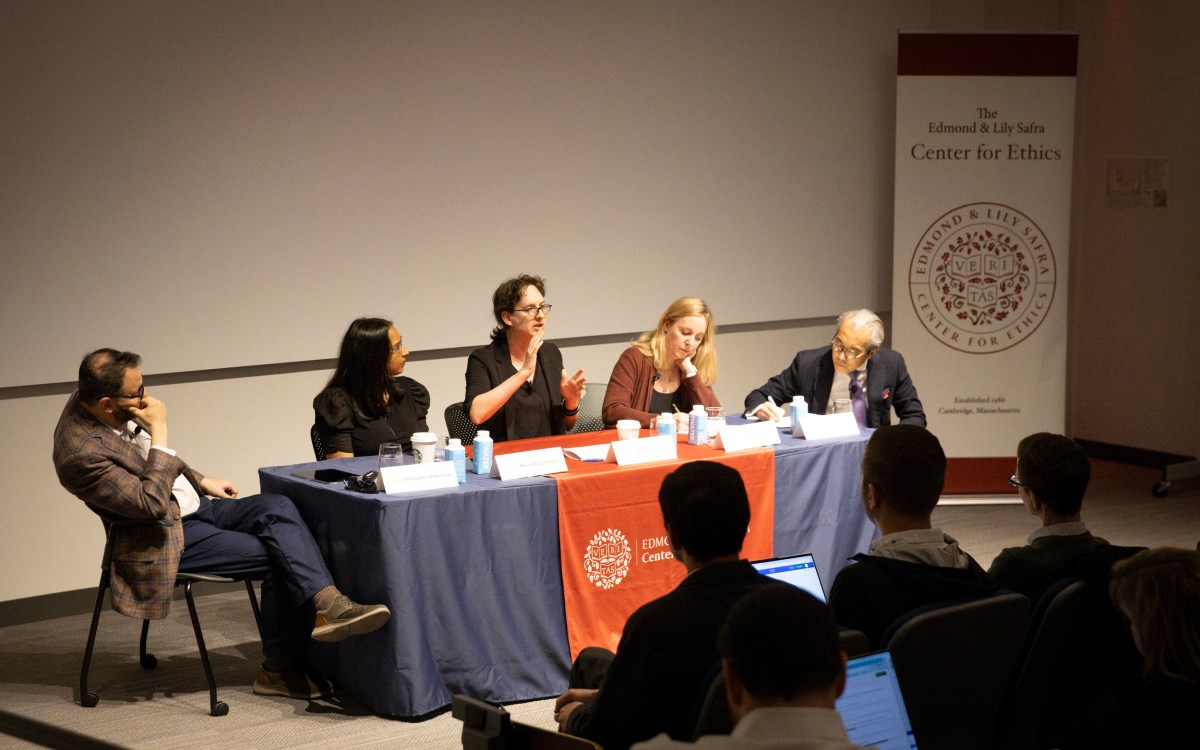Video by Ned Brown/Harvard Staff
Bacow returns to Michigan roots
During visit, Harvard president makes case for college to students, lauds city’s recovery
After being named the 29th president of Harvard University in February and taking office in July, Michigan native Larry Bacow rolled up his sleeves and went to work. But eventually he wanted to go home.
He fulfilled that desire late last week, traveling to his birthplace, Detroit, and to neighboring Pontiac, where he grew up and attended public schools. He met with students, educators, Harvard alumni, state and local leaders, and private-sector officials, and in his remarks lauded and promoted investment in the city and continued to make the national case for the importance of college.
During the trip — which included a visit to a local high school, a reception with Harvard graduates, and a conversation at a Detroit networking and ideas festival — Bacow repeatedly emphasized the “transformative power of higher education.”
His father, a refugee from the pogroms of Eastern Europe, parked cars at night to pay for college and earn a law school degree from Wayne State University, which helped rewrite the path of the new Harvard leader’s own life.
“He was the only member of his family to go to college,” Bacow told a crowd Friday at Detroit Homecoming, an annual event that brings together prominent leaders and others with Detroit ties for discussions and seminars on improving the city. “I would not be sitting here,” Bacow said, “but for the fact that my father was able to get an education.”
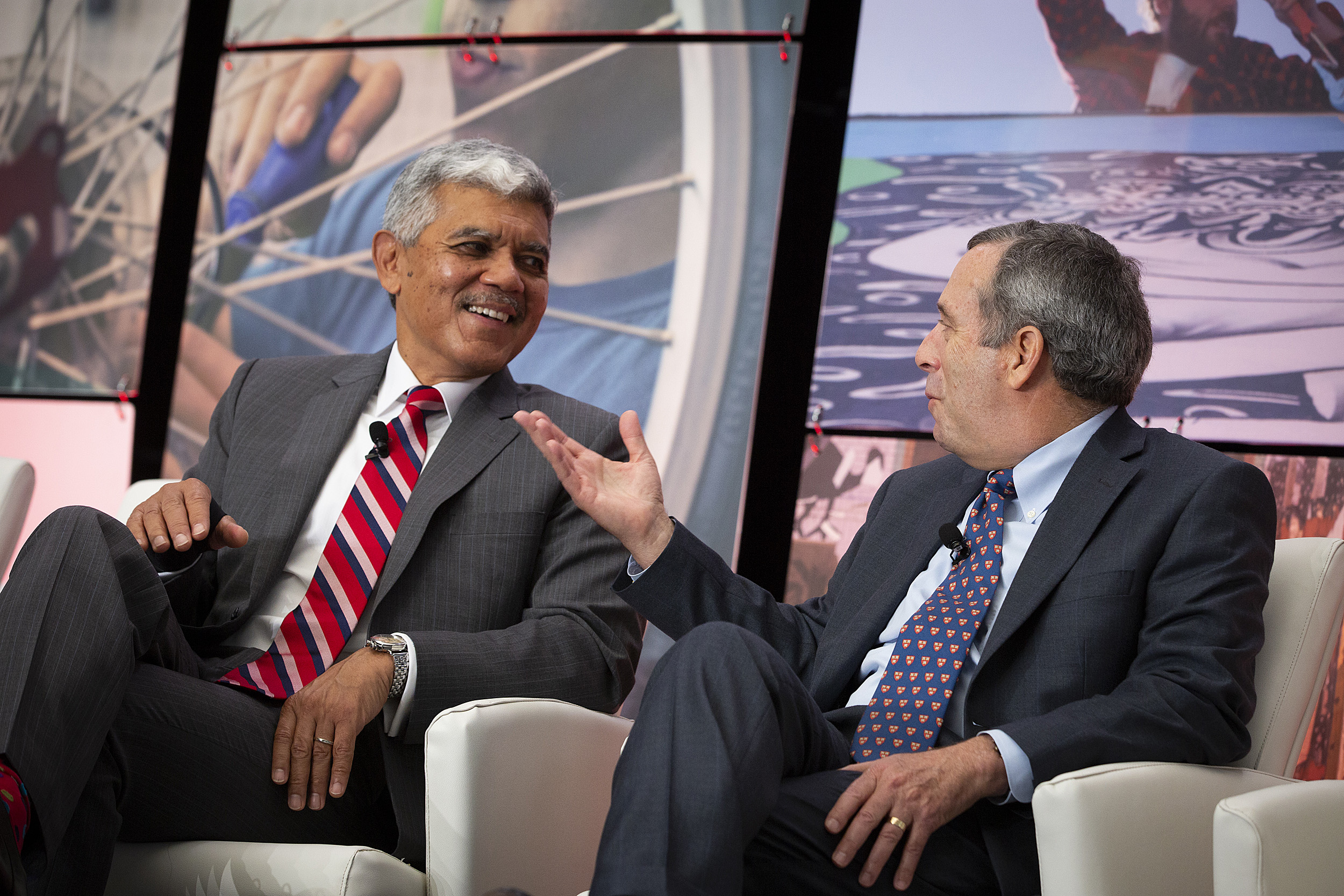
Wayne State University President M. Roy Wilson (left) and Harvard President Larry Bacow discuss topics such as the importance of financial aid and the role university collaborations can play in helping tackle some of society’s most pressing challenges.
Stephanie Mitchell/Harvard Staff Photographer
During his two-day visit, Bacow highlighted the city’s recent resurgence after years of decline. Detroit filed the largest municipal bankruptcy in the nation’s history in 2013, but only five years later is experiencing a renaissance — attributed in large part to an infusion of real estate investment fueled by the relocation of mortgage lender Quicken Loans’ headquarters from the suburbs to downtown. In many neighborhoods, new construction is eclipsing abandoned buildings, and shops and restaurants are springing up.
On Friday, Bacow sat down with Wayne State University President M. Roy Wilson to discuss a range of topics, including the education landscape in and beyond Michigan, the importance of financial aid and developing diverse communities of learners, and the role university collaborations can play in helping tackle some of society’s most pressing challenges.
During a Q&A session with Wilson and Mary Kramer, publisher of Crain’s Detroit Business, Bacow alluded to partnerships announced between Harvard and the University of Michigan aimed at combating the nation’s opioid crisis and confronting poverty in Detroit. Bacow said he hopes to pursue future collaborations with Michigan and other schools.
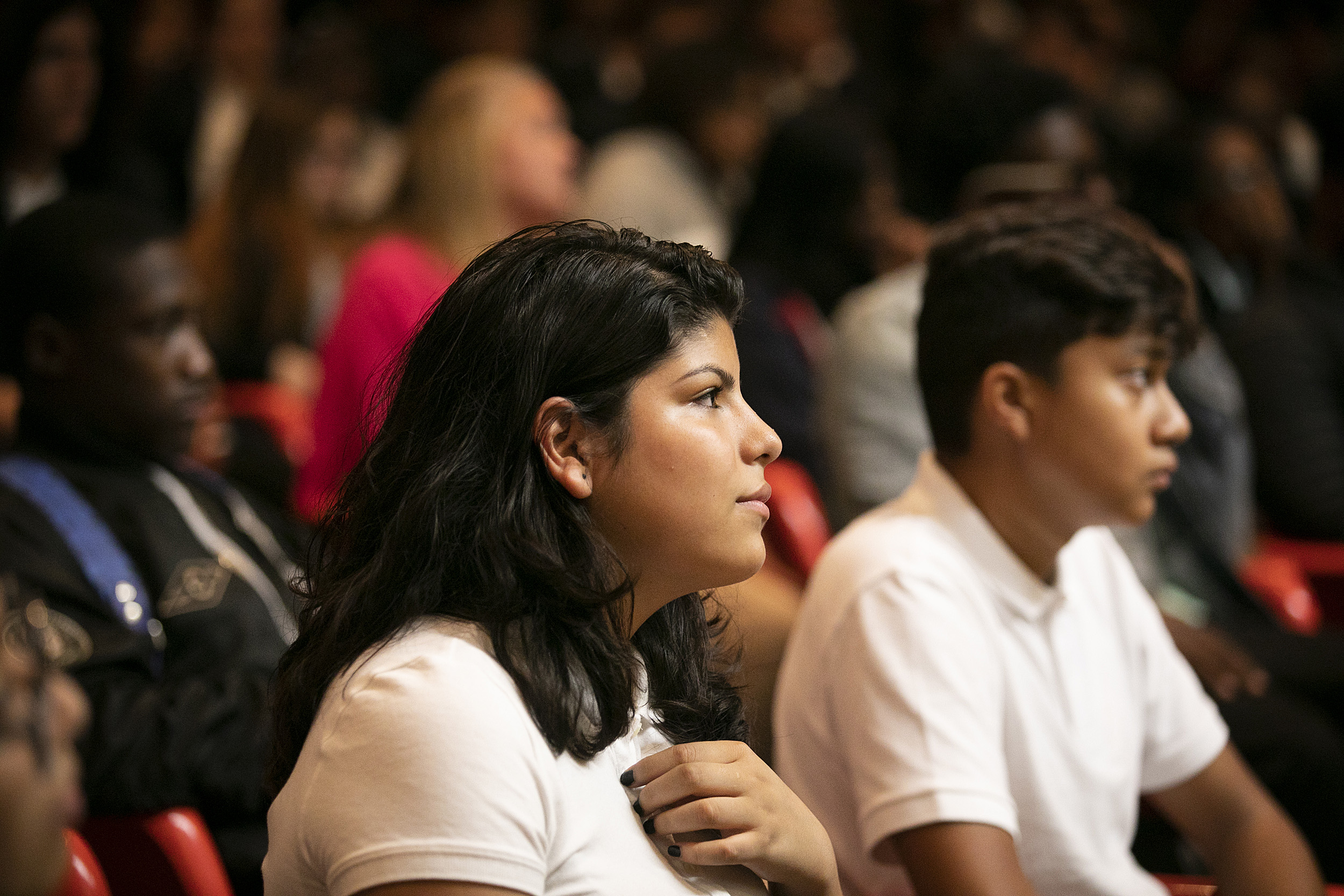

Students attend a talk with Bacow and Graduate School of Education Dean Bridget Terry Long.
Photos by Stephanie Mitchell/Harvard Staff Photographer
“I want to make sure that Harvard — but not just Harvard, all of our universities — are working hard to ensure what we can do to create opportunity for future generations,” said Bacow.
Training future leaders is at the heart of Wayne State’s REBUILD Detroit program, which works to set students from diverse backgrounds on doctoral tracks, said Wilson. He agreed with Bacow that ensuring that talented high schoolers are aware of financial aid and are encouraged to apply to college is crucial.
“The audacity that I had to apply to Yale early and apply to Harvard is because one of my teachers mentored me and explained to me that I could do anything I wanted to do,” said Wilson, a glaucoma expert who graduated from Harvard Medical School in 1980. “We’ve got to do that with the kids. It’s all about expectations — setting high expectations and letting them know what’s available out there and having them make that leap so they do apply to the Harvards and the Michigans and the Ivies. Too many kids just don’t even make that attempt, so it’s upon all of us to really help them.
“Not every kid is going to go to Harvard, and you can get a great education at lots and lots of places,” added Bacow, “and that’s why it’s important that we continue to support higher education broadly, across the board.”
More like this
Educating students for “careers over a lifetime” is another critical mission of colleges and universities, said Bacow, who noted that decreased state funding has shifted the financial burden for college from taxpayers to students and their families, sent tuition costs soaring, and helped erode the public’s faith in the value of college degrees.
“I think we are mortgaging our future. At a time in which other countries are doubling down on their investment in higher education, we are going in the opposite direction,” said Bacow, who added that colleges and universities need to stress to the public that the return on educational investment “has never been higher.”
During an earlier session, Mark Schlissel, president of the University of Michigan, said colleges and universities should be considered collaborators instead of competitors, and referred to the new Harvard-University of Michigan partnership as an example.
“The landscape over which we can do good is almost limitless, so what we are limited by is creativity and energy and resources, and every time we come together we think of ways to make one another better.”
Back to school
Bacow stopped by the International Technical Academy, a K-12 STEM school with 950 students that is part of the Pontiac School District. On Thursday morning the Harvard president, who loved science and tinkering with chemistry sets and Heathkit electronic sets, indulged his inner nerd on a tour of the robotics lab, led by students who make up “Wings of Fire,” the academy’s award-winning robotics team. The group proudly demonstrated the robot entered in last year’s competition, a chrome and plastic model designed to pick up 13-inch kickballs and deposit them on a scale.
Senior Darcy Mendoza was considering a career in nursing before she joined the team. Now she is eager to become a mechanical engineer.
Bacow visits the International Technology Academy with Pontiac Mayor Deirdre Waterman.
Stephanie Mitchell/Harvard Staff Photographer

“This is what I want to do,” said Mendoza, designer of the robot’s elevator mechanism, who interned for General Motors over the summer and hopes to design electric cars at the company someday. “[This field] just opens so many doors.”
Bridget Terry Long, Harvard’s new dean of the Graduate School of Education, accompanied Bacow on the tour along with his wife, Adele. Long watched as the teens’ robot grabbed a yellow fabric cube — a stand-in for the kickballs — and moved it to a wooden scale. Long listened as the students explained how different teams were responsible for the mechanics, the software, the pneumatics, the electronics, and the public relations.
“I love the teamwork,” said Long. “You each took a piece, but then it all has to work together.”
When Bacow asked about their biggest challenge, the students agreed it was going back to the drawing board when things didn’t work out.
“If at first you don’t succeed,” said Bacow, adding, “You guys should be proud of what you’ve done here. I used to have an erector set, but it wasn’t even close.”
Bacow and Long then looked in on a series of open classrooms arranged around a circular atrium where students lead presentations and discussions. They also paused in a hallway beneath blue banners celebrating the robotics team’s wins in recent competitions.
“That’s amazing,” said Bacow, looking up at the numerous awards.
Chatting with students
Bacow and Long also spoke to students in the auditorium. Backed by an image of the school’s mascot, a rising phoenix topped with a mortarboard, Bacow talked about how his own teachers fueled his lifelong interest in learning, inspired his curiosity in science and math, gave him an enduring appreciation for the arts, showed him how to think on his feet, and assured him that, “I could do anything and I could go anywhere. And you can too.”
Aim high, dream big, seek help from mentors and teachers, and above, all consider applying to college, said Bacow, noting that the one kind of student Harvard will never admit is the one who doesn’t apply. Long echoed Bacow’s comments, telling the teens, “Education gives you choices, allowing you to decide where you want to live and what you want to do with your talents, your passions.”
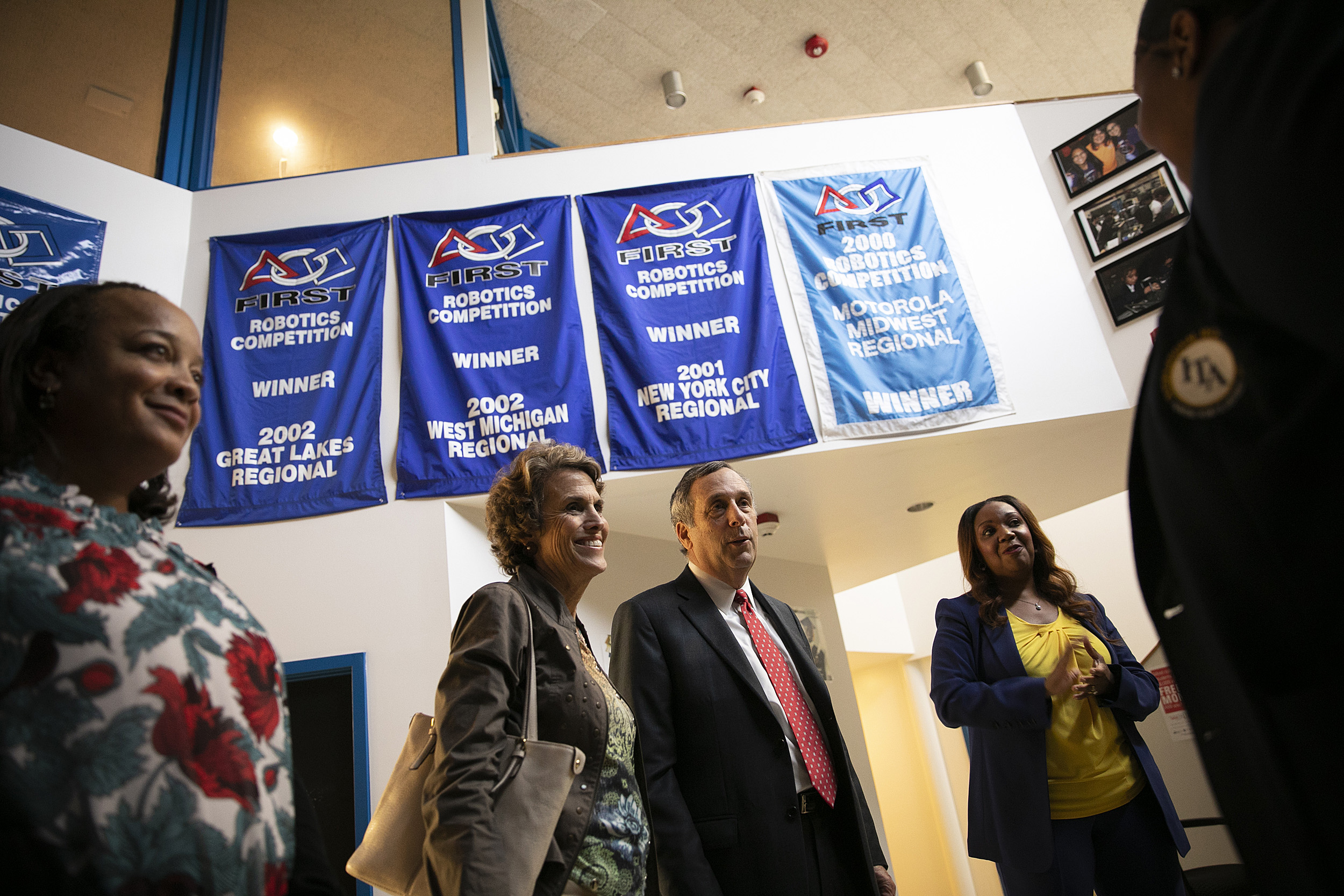
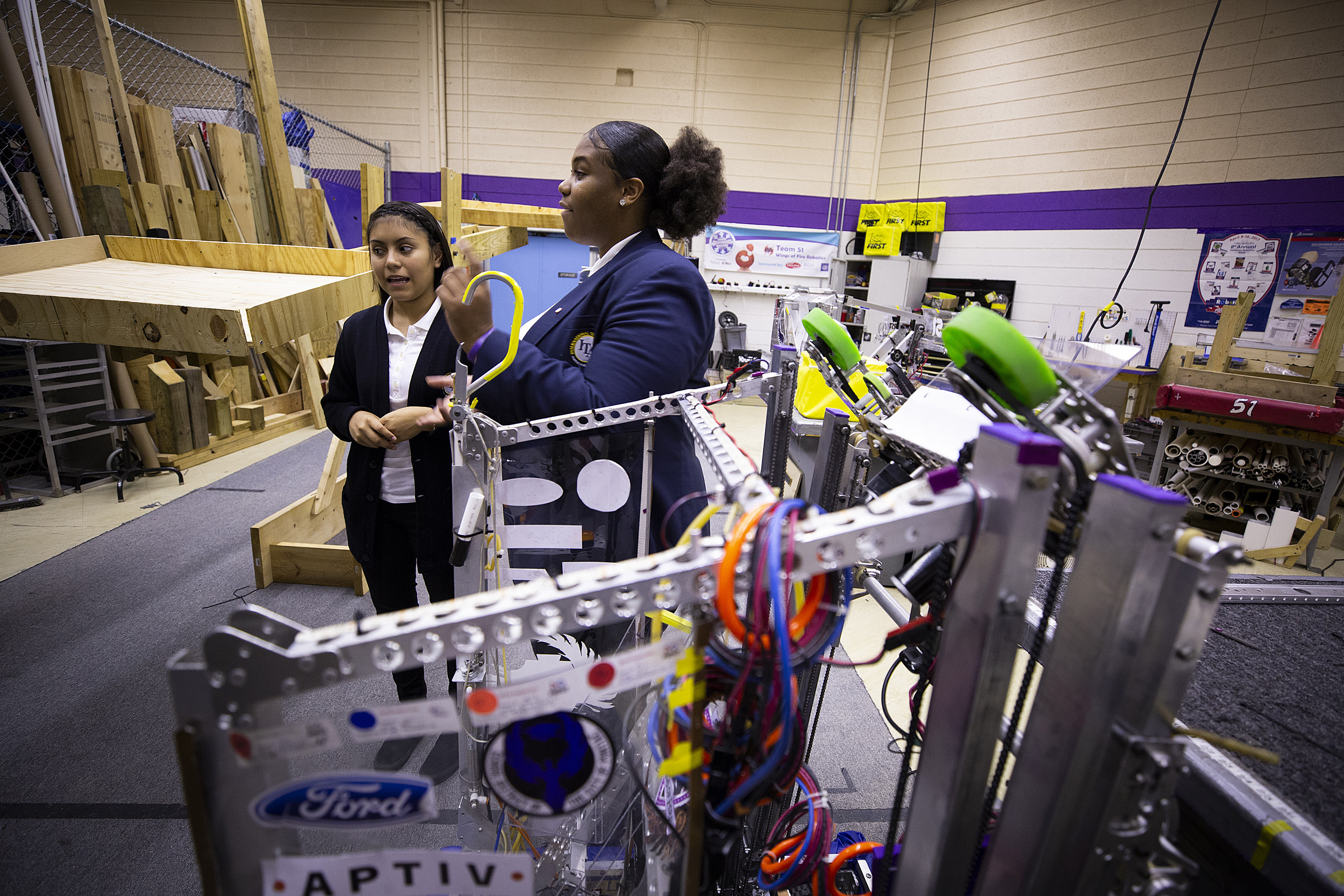
Image 1: Bridget Terry Long (from left), Adele Fleet Bacow, Larry Bacow, and Superintendent of Pontiac School District Kelley Williams meet with students Darcy Mendoza (left) and Dnaughtia Curry at the International Technology Academy’s robotics lab.
Photos by Stephanie Mitchell Harvard Staff Photographer
Some students asked about affordability. Bacow acknowledged that college isn’t cheap, but many programs offer expansive aid. For instance, Harvard’s financial aid program covers four years of tuition, room, board, and fees for students whose families make less than $65,000 a year, he said to applause and stunned looks.
“It’s a good deal. Take advantage of it,” he urged his listeners. “It could be you, it should be you. Why not?”
One Pontiac student who plans to apply to Harvard is 16-year-old junior Rebecca Murray, the lead mechanic on the robotics team whose plans to become an orthopedic surgeon changed when the club sparked an interest in environmental and mechanical engineering.
Murray said her mother, an engineer in the military who never got a college degree, primed her interest in robotics and in an advanced degree. “She is an inspiration to me. She’s very smart, but she didn’t have the opportunity to go to college like me. I want to make her proud, and if doing a Ph.D. does that, I am going to do that.”
Connecting with alumni
Meeting in a loft on the Detroit River with a view of Ontario, Canada, more than 300 alumni from Michigan and Ohio gathered to hear from Bacow at an evening session sponsored by the Harvard Club of Detroit, the Harvard Alumni Association, the Harvard Club of Central Michigan, and the Harvard-Radcliffe Club of Western Michigan.

The guests, representing every School and every class from 1952 to 2018, mingled and sampled local treats such as the Coney dog, a hot dog covered in chili; chicken and waffles; and skewers of tomato and mozzarella.
“It’s really good to be home,” Bacow told the crowd, as he gave a short sketch of his early life. He was born in Detroit, grew up in Pontiac, and spent time ushering at University of Michigan football games, visiting the Henry Ford Museum, and taking field trips to automobile plants, where he was transfixed by their assembly lines. Watching the chassis and body of a car come together at exactly the same time “was deeply satisfying to me as a kid,” said Bacow.
He said he recaptured that same sense of satisfaction and coming together as Harvard’s president. “This feels perfect … coming back home to Harvard, to Detroit in this new capacity.”
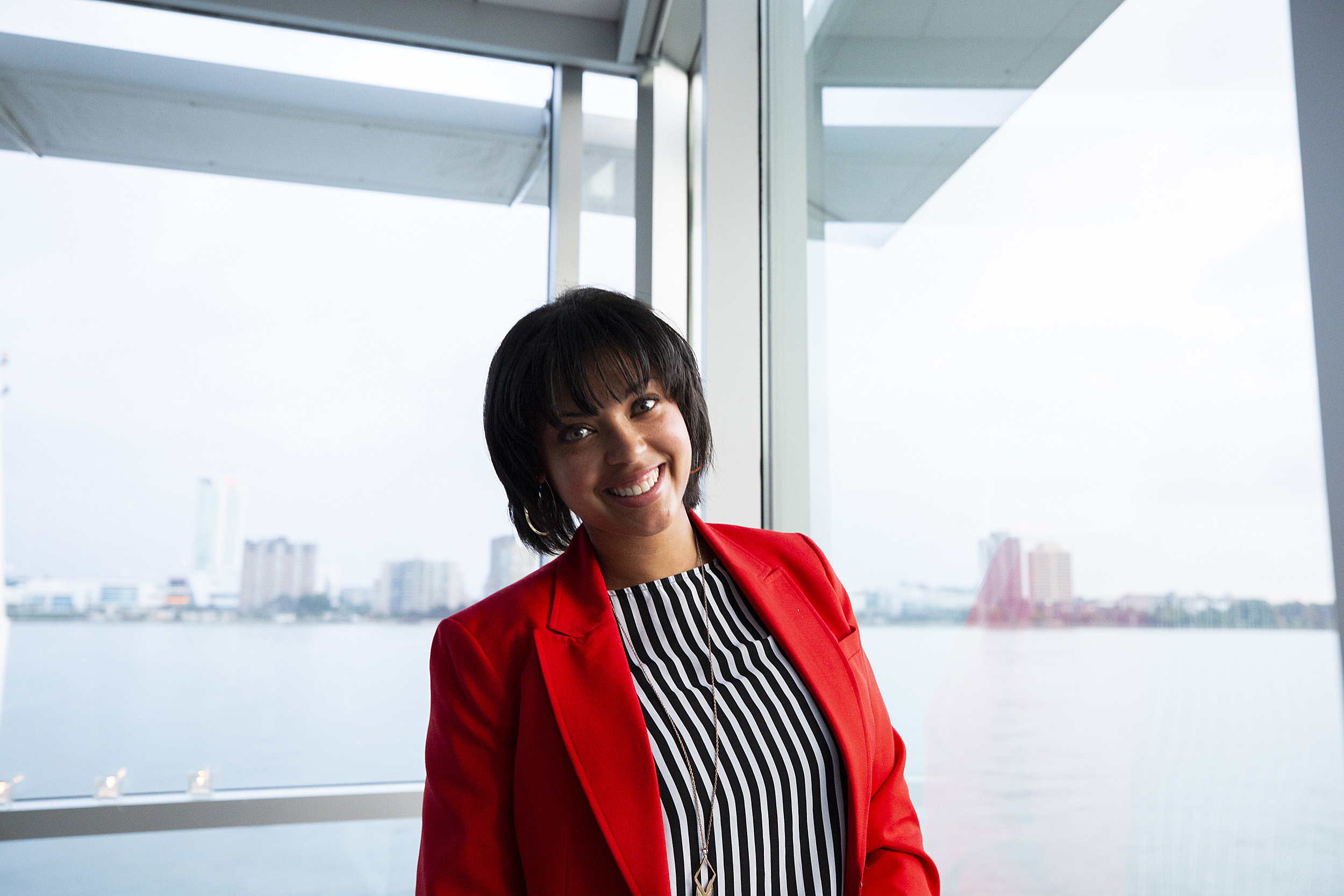
Bacow said he will use his presidency to continue to “speak to the enduring value of higher education as an enabler of the American dream.” He is heartened by the renaissance underway in Detroit and by the many Harvard alumni helping make it happen.
“This is a better city, this is a better country because of all of your collective efforts,” said Bacow.
One alumna making a difference is Kayla Shelton ’13, a construction supervisor for DTE Energy’s gas operations who leads the team that designs gas pipelines and services across southeastern Michigan. As an undergraduate, Shelton said she realized the Detroit she knew didn’t fit with the narrative many others held, and she decided “to make sure that I do what I can to help with the renaissance.”
A member of the National Society of Black Scientists and Engineers, Shelton frequently speaks with local high school students about careers in science and technology. She welcomed Bacow’s comments honoring “those people who have been serving in the city of Detroit or the Detroit area in different capacities and in different ways.”

